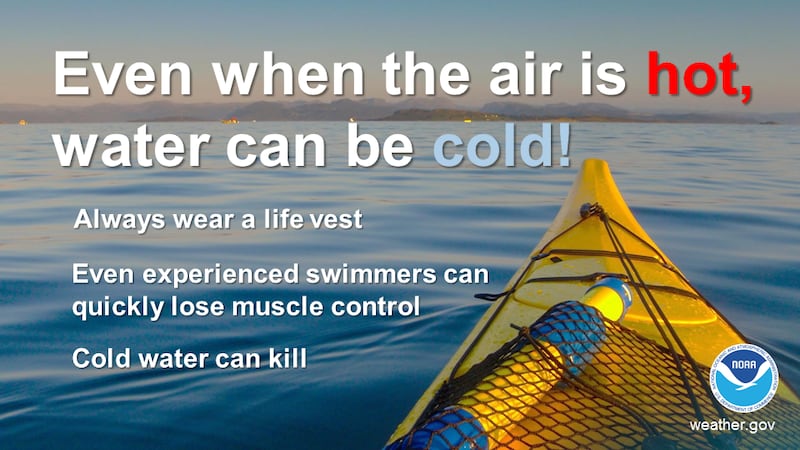Weather Blog: Cold Water Safety
Warmer days ahead mean more time on the water - here’s how to avoid becoming a statistic.

AUGUSTA, Ga. (WRDW/WAGT) - With summer-like temperatures becoming more consistent - many of us are ready to hit the water, but there are a few things to keep in mind when swimming this early in the season.
Air temperatures will be hitting the 80s later this week, but lake temperatures at Clarks Hill, Lake Oconee, and Lake Murray are between 65-72° degrees as of April 22, 2024. This might sound warm but the standard pool temperature is between 78°-84°.
Staying in cold water will cause a person’s body temperature to drop - leading to impairments physically and cognitively.
The National Center for Cold Water Safety says incapacitation happens as, “the result of muscle fatigue, loss of sensation, and loss of motor control, particularly in your arms, legs, hands and feet. The colder the water, the faster incapacitation occurs.” Even experienced swimmers can run into trouble when water temperatures are 70° or cooler.
The NCCWS classifies any water 70° or cooler as “cold water”. The center also recommends people wear wetsuits when swimming in water at 70° or cooler.
Facts from the National Weather Service:
- Body heat can be lost 4x faster in cold water than cold air
- Wearing a life jacket significantly increases the chances of survival
- Cold shock can be just as severe and dangerous from water temperatures of 50-60F (10-15C) as it is from water at 35F (2C).
- Gasping for a breath or rapid breathing from sudden immersion can be triggered by water as warm as 77F (25C).
Last year water temperatures at Clarks Hill stayed consistently above 78° starting in the middle of June and lasting until the middle of September. If you decide to swim in one of the local lakes be sure to check the water temperature before you go and wear a life vest.
Copyright 2024 WRDW/WAGT. All rights reserved.















